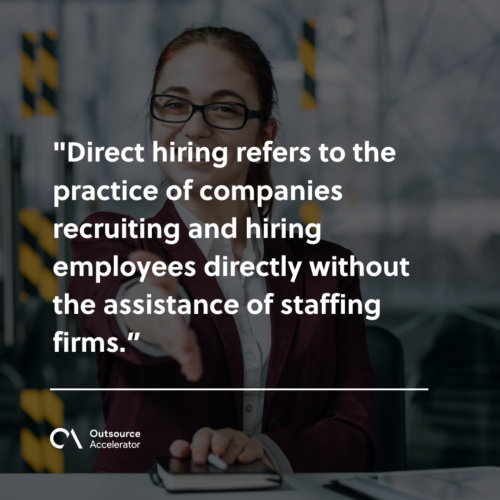The benefits and drawbacks of direct hiring

Naturally, your firm hires various employees according to the length of your project and the frequency of their work.
With this, you might experience hiring contractual work, outsourcing, or full-time employees for some of your positions.
Direct hiring is an approach in which companies directly hire job candidates rather than outsourcing or getting an employer of record (EOR).
This article explores the benefits and drawbacks of direct hiring.
What is direct hiring?
Direct hiring refers to the practice of companies recruiting and hiring employees directly without the assistance of staffing firms. Organizations take complete control over recruitment, from candidate sourcing to job offers.
Unlike contract hiring, direct hiring is geared toward hiring in-house employees in permanent and executive positions.

Why companies do direct hiring
Companies choose direct hiring for several reasons:
- Vetting applicants’ cultural fit. Direct hire is focused on hiring staff who are expected to stay long-term. Direct hiring can help employers vet their applicants according to their cultural fit, in line with this purpose.
- Avoiding hefty fees. Companies can avoid paying hefty placement fees or costs associated with contracting a recruitment agency, allowing them to allocate valuable resources to other business areas.
- Leadership hiring. Organizations cannot always outsource leadership hiring. The best way for them to get a top-notch leadership team is by vetting and hiring them directly.
Benefits of direct hiring
Direct hiring offers various advantages for businesses utilizing them, including the following:
Enhanced cultural fit
Direct hiring enables companies to select candidates who align with the organization’s values, culture, and mission. This is because they directly engage with the applicants, helping them get to know their potential staff.
When candidates feel a personal connection to the employer from the start, especially in company culture, they are more likely to stay with the organization.
Increased retention rates
Direct hiring can be a good start to investing in employees. Since employers get to hand-pick their staff, they can better know how to retain them through training and development efforts.
Greater control and flexibility
Direct hiring gives companies complete control over recruitment, allowing them to adapt their hiring strategies to specific needs and timelines.
This flexibility enables organizations to customize their recruitment efforts to attract the most suitable candidates for their unique requirements.

Drawbacks of direct hiring
On the other hand, firms that prefer direct hiring can also experience drawbacks to this practice:
Limited network
Direct hiring may limit access to a broader talent pool.
Without the involvement of recruitment agencies or staffing firms, companies may miss out on getting passive candidates. These are people who are not reached through traditional recruitment channels.
Limitations in small networks can constrain the variety of talent available for consideration.
Skill set gaps
Direct hiring can sometimes lead to skill set gaps within the organization.
Without the expertise of recruitment agencies, companies may struggle to identify and attract candidates with specific skill sets or niche experiences. Lack of expertise in screening can hinder the organization’s ability to hire for specialized positions.
Added responsibilities and risks
Direct hiring places the responsibility of due diligence, background checks, and verifying candidate credentials solely on the company.
This increases the risk of potential oversights and bad hires, negatively affecting the company’s performance and reputation.
Direct hiring process
Direct hiring involves the simple process of traditional recruitment and selection of staff, as follows:
Define the job requirements
Before starting the direct hiring process, companies must clearly define the job role, responsibilities, and required qualifications.
A well-defined job description helps attract candidates who closely match the requirements.
Attract and source candidates
Companies can use various methods to attract candidates directly. This includes posting job listings on their website, leveraging online job boards, utilizing social media platforms, and networking within industry-specific communities.
Screen applications and conduct interviews
Once applications are received, companies must screen them to assess candidate suitability.
Shortlisted candidates are then invited for in-person interviews to further assess their fit for the role. Companies can leverage behavioral and situational interview questions to evaluate candidates effectively.
Evaluate and assess
During the interview process, the recruitment team evaluates candidates based on their skills, qualifications, cultural fit, and potential for long-term success. This may involve conducting assessments or tests to evaluate specific competencies.
Companies can also assess candidates based on their alignment with the organization’s goals and values.

Extend job offers
After the assessment process, companies extend job offers to selected candidates that include details about compensation, benefits, and any other pertinent information.
Once an offer is accepted, the company can begin onboarding to integrate the new employee into the organization smoothly.
When to direct hire
Direct hiring is suitable when companies have the resources, time, and expertise to handle recruitment. It is particularly beneficial for organizations seeking long-term employees who align with their company culture and values.
Additionally, direct hiring is advantageous when companies have specific hiring needs and require full control over the candidate selection process.
In such cases, directly engaging with candidates allows companies to accurately assess their skills, cultural fit, and potential for long-term success.







 Independent
Independent




